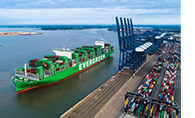China's relations with the West are becoming more troubled with EU tariff against Chinese EVs
 What differences there were between US and European trade policies towards China have largely disappeared of late. In the US, however politically divided the nation has been in the last year, both Democrat and Republican, have long been on the same page in regard to the China trade. What differences there were between US and European trade policies towards China have largely disappeared of late. In the US, however politically divided the nation has been in the last year, both Democrat and Republican, have long been on the same page in regard to the China trade.
President Donald Trump in his first term faced massive domestic opposition from the Deep State towards any initiative he took. The core of that opposition in residence had both created and sustained by a statist civil service loyal to the Democratic Party. From entry-level to its top administrative incoming cohorts supplied by the universities, which also produced an equally partisan national press corps over the last 40 years.
While US voters were divided 50:50 right and left - as was much of the western world - this was not the case in the media, academic, bureaucratic complex which skewed to the left on a 5:95 basis. Combined, these elements did what they could to thwart Trump's first term - domestically.
But not so much in foreign relations. First, US foreign policy is not an extension of domestic policy, not when it comes to trade. American anti-Trump shipmanagers, shippers, and beneficial cargo owners are no more forgiving of China's bullying than the most strident bedrock Republican. This bi-partisan - really non-partisan - approach reaches far beyond China and extends to American foreign policy worldwide.
Thus, the Deep State's will to damage American economic prospects in line with its "woke-ish" ideology in line with the World Economic Forum's "Great Reset" didn't work in foreign policy as they did in the US domestic realm. Such cultural Marxism may have been cherished in the US Department of Education, but it cut no ice in the State Department, where America's traditional xenophobia continued to flourish.
Ditto Europe. The EU has been more timid in regards to China. But less and less so and now no longer.
"The EU will impose a tariff of nine per cent on Tesla cars made in China and imported into the EU," reported China Economic Review. "Western Europe is taking seriously the implications of the massive manufacturing capability that China now has with EVs, and the combined threat that they pose to local automakers. In tandem, as usual, Beijing announced an anti-subsidy probe related to EU dairy products.
"So what is the expected outcome?" asks China Economic Review. "The answer is likely to be ever greater isolation for China, with a growing sense among policy makers and administrators in the West that the China over-production problem needs to be addressed strenuously."
It’s all unfortunate, given that the obviously good way for the world to move is towards greater integration than the opposite. With WTO entry in 2001, the West allowed China access to markets around the world, in return for a general commitment that China would play by the rules.
Other countries cheat, of course, but because China is so huge, its shenanigans can be destabilising. The view that its current reliance on exports, as a way to keep the domestic economy in relatively positive territory, is having a negative impact around the world is quite prevalent. Overall, the West needs China to be harmonious.
If the problem were merely trade-related, most feel something could be worked out. What makes this less likely are the non-trade initiatives China has undertaken and attitudes reminiscent of those of 18th century Emperor Gaozong Qing's haughty dismissive treatment of Lord MacCartney, who headed the first trade mission from the West in 1792.
Since 2013, there has been a change in attitude towards western the non-communist world. First, democracy itself was a contagion to be eradicated, and while the 1989 Tiananmen Square riots had been suppressed, the result did not engender support for the regime.
The mood of the people darkened and attempts to replace and export-led economy with one sustained by domestic supply and demand fell flat, and has stayed flat since.
Add to that, the growth Muslim concentration-re-education camps, threats to invade Taiwan, border fights with India, refusal to come clean about Covid and where it came from, plus the imposition of the "Nine dash line" that unilaterally claimed sovereignty of most of the South China Sea which has led to a standoff with the Philippines edging close to war.
So there is a lot Westerners may well find objectionable about closer ties with China quite apart from trade issues. It's real estate boom has gone bust. Entire cities that were built with such hope are now prey to the wrecking ball.
Much of what the global economy is built on is the phantom fear of global warming that drives the international carbon craze. This in fact drives the drive against cheap and abundant fossil fuels and a regulatory insistence we switch to costly electric vehicles (EV), which are suffering from overproduction in China and elsewhere.
As China becomes more difficult to deal with, Vietnam, India, Indonesia and the Philippines, not to mention Latin America, are ready, willing and increasingly able to take up the torch China has held for so long.
One can always hope that a different mood will prevail in the Far East, and a more live-and-let-live attitude we once took for granted, will let us find ways to work together for fun and profit. |